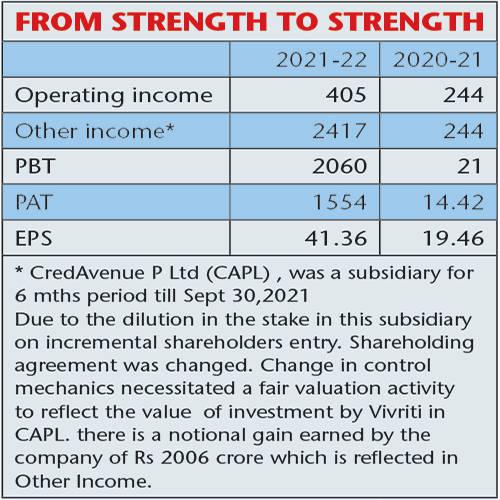-

Badrinathan: stringent processes are followed
While banks do a fair amount of lending, many companies still borrow from informal sources. Private banks largely give loans to meet their working capital requirements. The bonds market for mid-corporates is non-existent. “While there has been a huge penetration of equity and a huge penetration of insurance and a huge penetration of asset management products, debt to the mid-corporate space has not been as deeply entrenched as other parts of the ecosystem,” points out Sukumar. There are approximately 20,000 companies in the midmarket segment which, according to analysts, have reasonably good governance standards as well as a debt-to-equity ratio of 0.5 but are unable to raise funds or performance credit funds.
Vivriti Capital was registered as an NBFC in January 2018 and has been providing loans to midsize corporates, including those which have a rating below A and BBB and even unrated ones. The vision of the company is to become the number 1 technology enabled institution for midmarket enterprises with a cumulative credit flow of Rs1 lakh crore and support for 5,000 enterprises by 2026.
The track record of the promoter and the company has seen investors put in as much as $165 million in Vivriti Capital through Series A, B and C rounds of funding. Creation Investment Capital Management and London based Lightrock India, also participated in round C in which $55 million was raised towards the end of March 2023. TVS Capital was the new entrant to invest in the company during this round.
Creation Investment Capital, an impact manager in emerging markets, has been with the company since its early days and is also a major shareholder. The funds from the last round are to be used by Vivriti Capital for expansion and technology for acquisitions besides building a tech-based platform focussed on performing credit for its AMC business.
The AMC business was set up by Vivriti Capital in 2019 as a subsidiary. Until now the AMC has managed 10 category II AIF funds, three of which are still open (funds registered with SEBI but do not leverage or invest in securities markets). Two of these funds have SIDBI as the major contributor with Vivriti coming in with the statutorily required funds as the anchor partner.
The final closure of the first fund took place in March 2020. One fund has been registered in GIFT City. Of the three live funds, Alpha Debt Fund A, Alpha Optimiser A, and Emerging Corporate Debt Fund are all close ended funds with a life of 3.5 years from the final closure date.
These AIFs source funds from multiple sources including HNIs¸ family offices, companies and institutions, and insurance companies with around 20 per cent raised from overseas entities. Amongst the 350 unique investors one DFI institution has come in as an anchor investor with a commitment of Rs500 crore. Others include SBI, SIDBI, CSB Bank, Federal Bank, RBL Bank.
Insurance companies include SBI General, Royal Sundaram, Navi Insurance, Reliance General Insurance. Corporates includes Hinduja Housing, Hinduja Leyland Finance, Aditya Birla Finance, Infina, MAS Financial Services and Acsys. It was amongst the first to launch a market linked debenture (MLD) aimed at generating marginally higher returns for investors.
-
While there has been a huge penetration of equity and a huge penetration of insurance and a huge penetration of asset management products, debt to the mid-corporate space has not been as deeply entrenched as other parts of the ecosystem
Between Vivriti Capital with Rs6,000 crore and Vivriti AIF (Rs2,000 crore-plus and undrawn credit of another Rs3,000 crore) Vivriti has an asset size of Rs8,000 crore. The funds have been lent to around 500 companies and dealers of some of these companies. The loans are provided to meet borrower working capital requirements, as well as for vendor financing, dealer financing, securitisation, co-lending, issuance of NCDs and commercial paper.
Additionally, the company has started two new activities: leasing and factoring. “We open our product arsenal to midsized companies to meet their varied needs. Whether they want to buy a machine or they want their vendor to get money or they want just working capital or they want to grow or they want to initiate their capital market journey through an NCD or they want to sell their receivables, we are there,” Sukumar points out. He is fond of saying: “We service the M in the MSME class.”
Unlike banks which take cash as collateral and lend at 9-10 per cent, Vivriti takes bills receivables as collateral for lending. Interest is charged between 13-15 per cent. For term loans, payment is taken in instalments over the 2–3-year tenure.
“Vivriti Capital has a good model and is used as a proxy by several institutions who cannot lend directly to mid-sized companies,” says A Balasubramanian, MD and CEO, Aditya Birla Sunlife Mutual Fund. “They enable non-investible companies to become investment grade companies and allow them to scale up their businesses,” he adds.
Quick turnaround
In the business of lending, NPAs are given. However, in the case of Vivriti Capital the NPAs in the last fiscal year (till December 2022) were limited to 0.3 per cent. “Stringent processes are followed during on-boarding,” says Srinivasaraghavan Badrinathan, CFO. “In-depth credit and risk diligence happens at the time of onboarding and it’s a rigorous process that one has to go through before they (mid-corporate borrowers) can get on to my book. And that really helps. And that really shows in the GNPA and in the entire 5-6 years, 0.3 is the highest.”
Badrinathan adds that “even though the process is diligent and very detailed, the overall turnaround time by which we go back to the customer for the loan is very, very quick compare to the banks. We complete the entire process end-to-end within two weeks.” The policy of giving funds to only profitable companies also helps as Vivriti does not lend for repayment of loans or distressed loans.
Besides personal meetings, a lot of due diligence is automated. Third party reviews are also used for assessment. Vivriti, through its proprietary technology has compressed the time for onboarding new customers and analyses data from various sources including bank statements, GST data, pension payments, etc. They also get feedback from vendors and others. Market feedback is often played back to the borrowers as a value-add to enable them to take remedial action.
While many banks can match the delivery time, access to credit is not as easy especially for unrated companies. And this is where the specialised companies score. Secondly, companies like Vivriti offer a wide bouquet of products and customise them for each customer. In the case of term loans, the period could range from 18-24 months while in the case of working capital it could be around 90 days. The upper limit in the case of all borrowers is pegged at Rs40 crore.
-

Interestingly Vivriti Capital also sources funds from various sources including banks. And then passes this on to borrowers. Vivriti sources funds at floating rates and onward lending is also done on floating interest rates.
“Vivriti Capital is continuously innovating products,” says Ajay Garg, founder & managing director, Equirus Capital, a full-service investment banking outfit. Garg adds that Vivriti provides a good investment opportunity to HNI and companies across sectors.
Technology and professionalism brought in largely to B2B lending has enabled the company to earn a good return on assets. The return of assets as on 31 December stood at 2.9 which is comparable and even better than several banks and NBFCs. The total income for Vivriti Capital as on March 2022 was Rs405 crore and the EPS was double that of the previous year’s. EPS for FY22 was Rs41.36 on a consolidated basis as against Rs19.46 the previous year.
In 2020 Vivriti also set up a platform to facilitate loans – bringing the giver and the needy on a platform. The debt marketplace platform business was earlier called CredAvenue Private Ltd. It has now been rechristened Yubi. This is an online integrated enterprise debt platform and a one-stop solution for prospecting, evaluating, executing and monitoring debt. “Around August 2020, we spun off our sister concern CredAvenue into a separate entity which was later separated,” says Badrinathan, adding that this is a separate entity managed by Gaurav Kumar and is independent of Vivriti Capital despite some cross-holding of stakes.
Yubi was valued at $1.3 billion in July 2022 itself. The reorganisation following the separation and the subsequent valuation was given effect to in FY22 itself. And the gain on revaluation arising from the giving effect to the change resulted in a notional profit of Rs2,006 crore which was shown in the consolidated accounts under the head of other income.
Vivriti Capital which currently has a 300 people strong employee base across 8 locations in India has set its eyes on the international markets. While it has an office in GIFT City it has recently set up an office in Singapore. “Singapore is like a gateway to the world. Having a presence there will give us access to very large investors – American, European, Asian – who have a base in Singapore,” confides Sukumar. “Our focus will however be on mid-markets which still offers huge opportunities.”
As of now the company is not looking at an IPO. Like its investee companies, Vivriti feels that it still has a long way to go and scale up. Besides being a B2B company it is not well-known across the investor community. After spinning off one unicorn, Vivriti itself could become a unicorn in a couple of years if not earlier.




































